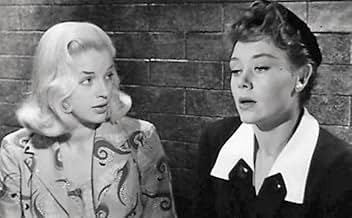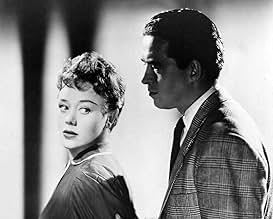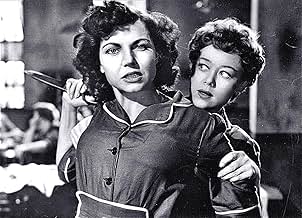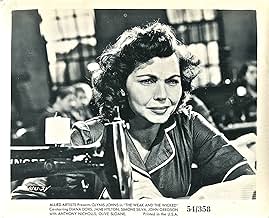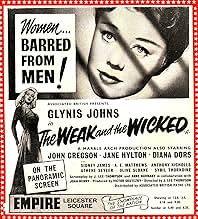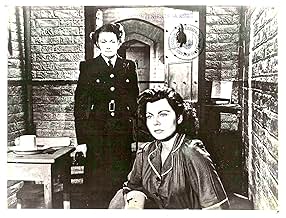AVALIAÇÃO DA IMDb
6,4/10
422
SUA AVALIAÇÃO
Adicionar um enredo no seu idiomaFrank "women in prison" story that sympathetically tracks several inmates through their imprisonment and subsequent return to society. Some are successfully rehabilitated; some are not.Frank "women in prison" story that sympathetically tracks several inmates through their imprisonment and subsequent return to society. Some are successfully rehabilitated; some are not.Frank "women in prison" story that sympathetically tracks several inmates through their imprisonment and subsequent return to society. Some are successfully rehabilitated; some are not.
- Direção
- Roteiristas
- Artistas
Avaliações em destaque
Glynis Johns is railroaded into prison for insurance fraud, where she initially despairs. However, the knowledge that her young man is waiting for her and the kindly prison warden buck her up. Eventually she is transferred to a 'prison with bars', where she meets, in the words of Anna Russell, all sorts of terribly interesting people, including Diana Dors and Olive Sloan.
It's directed by J. Lee Thompson from a book by Joan Henry, who was one of his wives; it was based on her prison experiences, and she called the Johns character "a bit goody-goody". Indeed she is. Except for one impassioned speech at the end, she's largely a sounding board for others. She's also rather heavy-set and middle-aged looking to add to her anonymity. Miss Dors gets the better role, and does a good job with it. Thompson would work with her later.
It's directed by J. Lee Thompson from a book by Joan Henry, who was one of his wives; it was based on her prison experiences, and she called the Johns character "a bit goody-goody". Indeed she is. Except for one impassioned speech at the end, she's largely a sounding board for others. She's also rather heavy-set and middle-aged looking to add to her anonymity. Miss Dors gets the better role, and does a good job with it. Thompson would work with her later.
Before he became popular directing Charles Bronson films, J. Lee Thompson directed two prison movies based on books written by his future wife, Joan Henry. Glynis Johns does very well as the gambler who is framed for insurance fraud and sent to prison for one year. Here she meets the inmates who relate their stories of crimes that sent them up for time: a shoplifter, a blackmailer, and a neglectful mother. She stops one from stabbing a cruel guard and is rewarded with a transfer to a prison without walls. It's also very touching in the visitation scenes with her fiancé and doctor (John Gregson) how she feels the stigma of her sentence from the outside world. Only beef with the film I have is that there is no flashback to explain what crime her best friend, Betty (Diana Dors) did to serve two years. Her chum is desperate to find a boyfriend, Norman, that never writes or visits.
Although there was probably some serious intent behind the film's premise e.g. the open prison system, social comment on post-war England as class barriers are breaking down which are interspersed throughout, it is the gentle humour that lifts it above the mediocre. Superb cameos from the great Athene Seyler and Sybil Thorndike playing two friends who plot to 'do in' an elderly admirer is made a great deal of by the director. The central story involving Glynis Johns is well told and each of the film's subsequent yarns make for a light but thoroughly enjoyable whole.
A peculiar mixture this, with an attempt to portray something of the reality of contemporary womens' prisons on one hand, combined with comedy flashbacks and a fictional approach to crime on the other.
The story centres around Jean Raymond (Glynis Johns) who is the subject of an elaborate frame when she can't pay her gambling debts. In reality, a half competent barrister could have destroyed the case against her, should it have ever come to court in the first place, but here she's sent down for twelve months. There follows her experiences in the grim Blackdown Jail and then The Grange, a progressive 'prison without bars'. Many of the usual clichés of such films are avoided and the staff are shown as being very strict, but fair. One of the comedy episodes features a comical family of shoplifters headed by Sid James and Olive Sloane; Sid's prominent position in the cast list, despite a relatively brief appearance, is notable even at this stage of his career. Another piece of nonsense has a wooden Sybil Thorndike attempting to murder her husband, and then framing Athene Seyler for blackmail. By contrast the scenes in the prison hospital are more realistic, with Jane Hylton giving perhaps the best performance as Babs, haunted by the death of the baby she had neglected. Though third billed, Diana Dors is not very memorable in what is little more than a supporting role. A couple of years or so later she was to give her finest performance for the same director in YIELD TO THE NIGHT.
The finale, with the orchestra in full flow, is as contrived and sentimental as anything that Hollywood could produce. Despite or because of its various eccentricities, I quite enjoyed this.
The story centres around Jean Raymond (Glynis Johns) who is the subject of an elaborate frame when she can't pay her gambling debts. In reality, a half competent barrister could have destroyed the case against her, should it have ever come to court in the first place, but here she's sent down for twelve months. There follows her experiences in the grim Blackdown Jail and then The Grange, a progressive 'prison without bars'. Many of the usual clichés of such films are avoided and the staff are shown as being very strict, but fair. One of the comedy episodes features a comical family of shoplifters headed by Sid James and Olive Sloane; Sid's prominent position in the cast list, despite a relatively brief appearance, is notable even at this stage of his career. Another piece of nonsense has a wooden Sybil Thorndike attempting to murder her husband, and then framing Athene Seyler for blackmail. By contrast the scenes in the prison hospital are more realistic, with Jane Hylton giving perhaps the best performance as Babs, haunted by the death of the baby she had neglected. Though third billed, Diana Dors is not very memorable in what is little more than a supporting role. A couple of years or so later she was to give her finest performance for the same director in YIELD TO THE NIGHT.
The finale, with the orchestra in full flow, is as contrived and sentimental as anything that Hollywood could produce. Despite or because of its various eccentricities, I quite enjoyed this.
This film concerns itself mainly with two women, "Jean Raymond" (Glynis Johns) and "Betty Brown" (Diana Dors) who are sent to prison on the same day. Jean is sentenced to one year in prison for fraud. Betty, on the other hand, is given two years in prison because she chose to take the rap for her conniving boyfriend. Naturally, there are other female convicts as well and we get to see some of their stories in a series of flashbacks. I found a couple of these stories were interesting but I will leave it to the viewer to decide for themselves which ones they may or may not find entertaining. One thing I will say, however, is that this film is very British. At least it seemed that way to me. Also, this movie is not the standard women-in-prison film one might expect to find these days. There is no sex, violence, foul language or nudity of any kind. But both Glynis Johns and Diana Dors performed in a decent manner. I also thought both ladies looked quite nice with Glynis Johns appearing the more elegant of the two. Anyway, although not necessarily a great movie it wasn't bad either and I rate it as about average all things considered.
Você sabia?
- CuriosidadesJoan Henry's original novel 'Who Lie In Gaol' was based on her own experiences of prison. In debt from gambling, she took a forged cheque from a friend as a loan, and was convicted at the Old Bailey in 1951. Sentenced to twelve months, she served eight, primarily in Holloway Prison of which she was very critical, and later at Askham Grange Open Prison. The Glynis Johns character is based on her, although Henry thought her "a bit goody-goody".
- Erros de gravaçãoDuring the entire length of her prison term, Diana Dors maintains her artificially bleached and obviously waved hair style; Glynis Johns also maintains a more casual, but still very professionally maintained style from start to finish.
- Citações
Jean Raymond: No one wants to give a girl with no talent a job.
- ConexõesFeatured in A Bit of Scarlet (1997)
Principais escolhas
Faça login para avaliar e ver a lista de recomendações personalizadas
Detalhes
- Data de lançamento
- País de origem
- Idioma
- Também conhecido como
- Young and Willing
- Locações de filme
- Wilton Place, Knightsbridge, Londres, Inglaterra, Reino Unido(dress shop where Jean worked - exterior of The Berkeley Hotel.)
- Empresa de produção
- Consulte mais créditos da empresa na IMDbPro
- Tempo de duração
- 1 h 28 min(88 min)
- Cor
Contribua para esta página
Sugerir uma alteração ou adicionar conteúdo ausente

